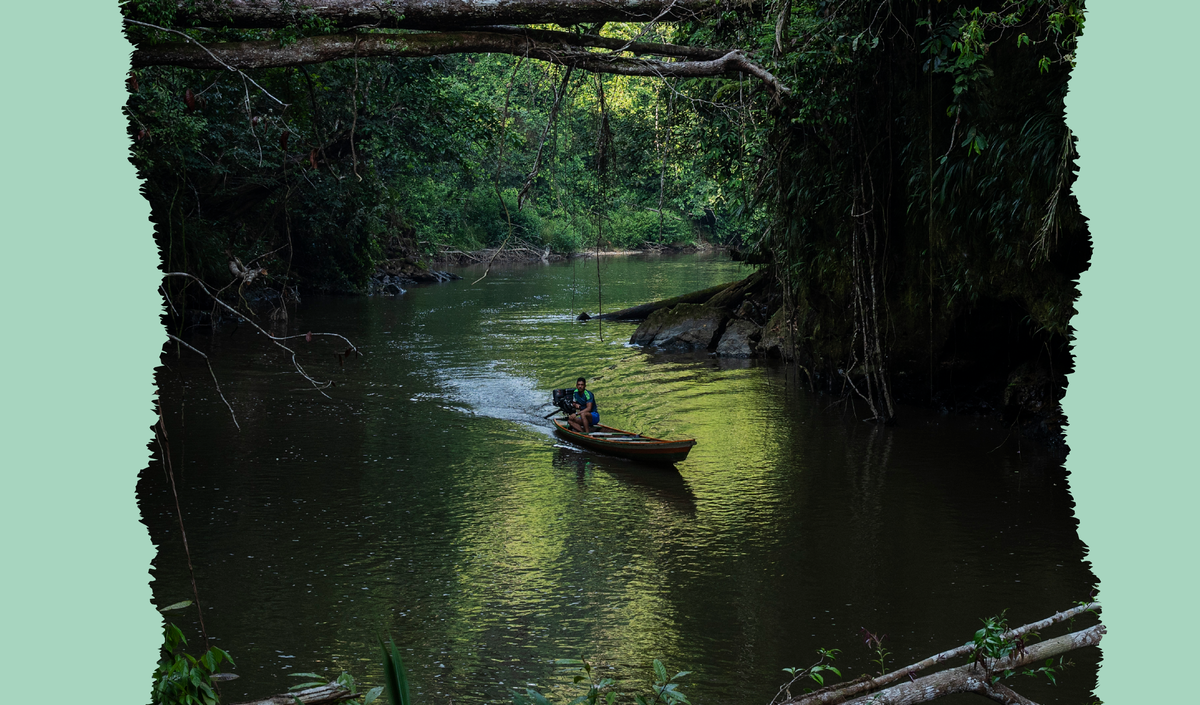Message from our CEO
Just over 25 years ago, Global Witness was set up to end the corrupt extraction and destruction of natural resources.
Our investigations exposed the illegal logging funding the Khmer Rouge, the blood diamonds fuelling conflict in Angola, Liberia and Sierra Leone, and the exploitative and shady deals forged by oil companies operating in Sub-Saharan Africa.
Today our mission of protecting the planet’s vital resources remains as critical as ever, but our ambition has grown. The climate emergency means we can no longer be satisfied with calling out corruption in the extraction and commoditisation of timber, fossil fuels, minerals and the Earth’s other raw materials.
Even drastic improvements to the way companies and governments operate in this space will not be enough to stop the calamitous impacts of increased global warming.
That’s why we’re joining allies, activists and campaigners around the world to call for a climate revolution.
Over the last three years, we’ve re-focused our work to more directly address the underlying causes of the climate crisis and are bringing our investigative skills, our advocacy experience and our communications prowess to hold those companies and governments to account for their destruction of the environment, their disregard for the planet, and their failure to respect human rights.
All over the world, the industries reliant on exploiting the planet – from logging companies to Big Oil and the financial institutions that bankroll them – are using a range of distraction techniques to delay or prevent the kind of action we need to stop the worst impacts of climate breakdown: the droughts, the flooding, the wildfires, the transformation of thriving land into desert.
Corporations trumpeting new green initiatives know they won’t be enough.
But they are using their immense PR machines and links to world leaders to divert attention away from the changes needed to safeguard people and precious natural habitats, including an end to fossil fuel extraction, proper protection for climate critical forests and real accountability for companies that damage the environment and fail to uphold human rights.
Last year our new campaigns continued to grow, gathering momentum to push for major legislative change, pile media and political pressure on the companies and individuals who are contributing to environmental destruction, and ending practices that support the further degradation of the planet.
2020 was a challenging year for all organisations, as we have been forced to adapt to a world in which social contact, travel and in-person communication have been prevented by the global pandemic.
Despite that, with support from all our incredible partners and generous donors, the talented team at Global Witness has delivered real impact.
We continue to take on some of the most powerful individuals and companies in the world. And despite not being able to meet, we retain the solidarity and unity of purpose to carry on working towards a better future.
I’m so grateful to all those who stand shoulder-to-shoulder with us. Thank you!
Mike Davis, CEO
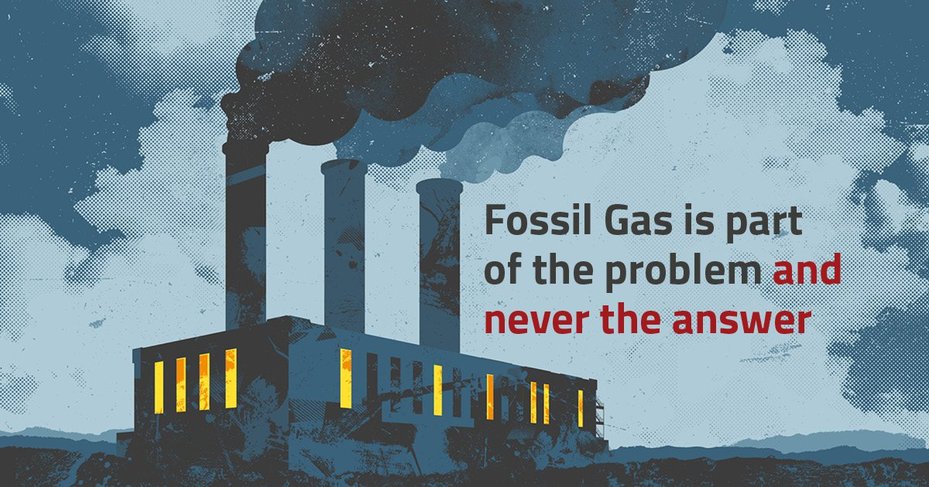
Still from the "Why is natural gas bad for the climate?" animation / Global Witness
Our campaigns
Global Witness campaigns on six key issues:
Ending the destruction of climate-critical tropical forests by curbing the flow of finance to those industries that profit from deforestation
Our 2019 landmark report Money to Burn showed how over 300 banks and investment funds in all parts of the globe contributed more than $44 billion to companies responsible for deforestation, especially in the Amazon, Congo Basin, and Papua New Guinea (PNG).
We are campaigning for governments to introduce new rules and policies to tackle the financing and supply chains fuelling global deforestation.
Ending the killing of land and environmental defenders, and ensure those who commit or are complicit in violence against them face justice
Our work exposes the links between incidents of intimidation or violence against defenders and irresponsible global agribusiness, which is complicit – and sometimes even instigating – such violence.
We aim, through investigations, research and advocacy, to alter the behaviour of companies and governments that seek to disrupt the campaigns of land and environmental defenders by any means.
Ending the growth of gas – the last fossil fuel
The fossil fuel industry is funding a global public relations campaign to influence opinion in favour of a shift to gas, which is presented as a solution to the climate crisis, but is actually the complete opposite.
Our report “Overexposed” revealed that all production from new oil and gas fields – beyond those already in production or development – is incompatible with the goal of keeping warming under 1.5°C. Going above this level would have devastating impacts on human societies and the environment around the world.
We are campaigning in the EU and the US, to stop taxpayers’ cash and government policies being used to prop up unviable fossil gas projects and expose the malign influence peddled by the gas industry on our political leaders and major legislative bodies.
Ending corporate corruption and improving governance in the natural resources sector
All too often deals are done that enrich and empower elite politicians, breed impunity and widen existing inequalities. Instead of benefitting from their country’s natural resource wealth, local communities are often left with a legacy of environmental destruction and sometimes violent repression or even armed conflict.
Our aim is to bring about an international system of corporate accountability and responsibility through new global norms and national laws, so that corporations cannot operate above the law either in the countries they work in or those where they are headquartered.
Ending the division, hate and disinformation spread on digital platforms
Social media companies and Big Tech have pervaded our lives to an astonishing degree. Yet, time and again, we have seen how the use of Facebook, Google, Twitter and other platforms can amplify racist, misogynist and divisive content – even to the extent of inciting violence and undermining democracy.
The way they are set up means they profit from the most attention-grabbing content, even when this leads to harm in the real world.
We are campaigning to hold online platforms to account for their damaging business model. Our long-term goal is a world where social media companies and Big Tech are forced to operate transparently and where online hate and discrimination do not flourish unchecked.
Ending corporate complicity in environmental and human rights abuses
We are campaigning for new global standards to stop companies being able to operate in a way that drives environmental and human rights abuses.
Joining our partners and social movements around the world, we aim to force the hands of governments to ensure corporations who undermine the law start acting in the public interest and serve notice on those responsible for undermining progress towards a more sustainable, equitable future.
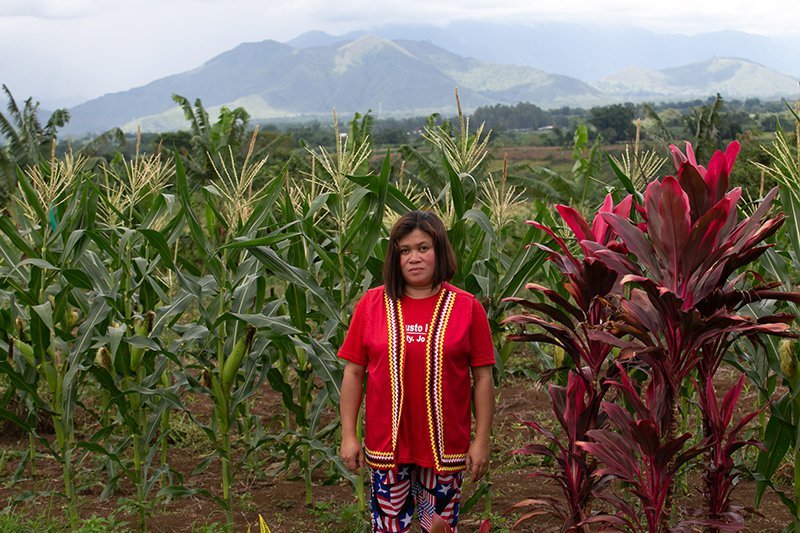
Cheryl Cagaanan’s home was destroyed during the demolition of the village of San Jose, Impasugong Town in Bukidnon Province, Mindanao, The Philippines. Jeoffrey Maitem / Global Witness
Spotlight on impact
We have achieved a lot in 2020, both in terms of tangible changes to legislation and in building the foundations for our longer-term campaigns.
Here we have highlighted 10 of our most significant impacts from the last 12 months:
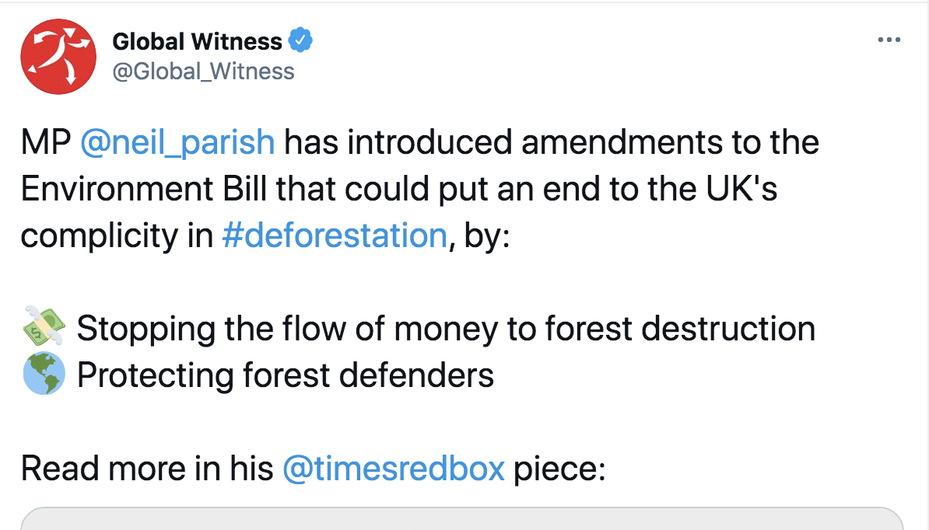
A tweet highlighting the Chair of the Environment, Food and Rural Affairs Committee, Neil Parish MP, tabling an amendment to the Environment Bill to ensure the role of financial institutions is properly covered
New legislation in the UK to tackle deforestation in supply chains
Over two years, we built a strong case for action through investigative case studies and policy briefings which we presented in meetings with key policy-makers as well as through the media, digital communications and work with allies.
We developed a tool to mobilise our supporters behind the campaign with over 2,000 people writing to the UK government calling on them to bring forward new laws – with a particular focus on the rights of indigenous people and the role of financial institutions.
Our report Beef, Banks and the Brazilian Amazon exposed the role of UK banks in backing companies linked to deforestation.
As a result of the media coverage of this research, the Chair of the Environment, Food and Rural Affairs Committee, Neil Parish MP, has tabled an amendment to the deforestation legislation to ensure the role of financial institutions is properly covered.
We are now working with him to build support for this amendment.
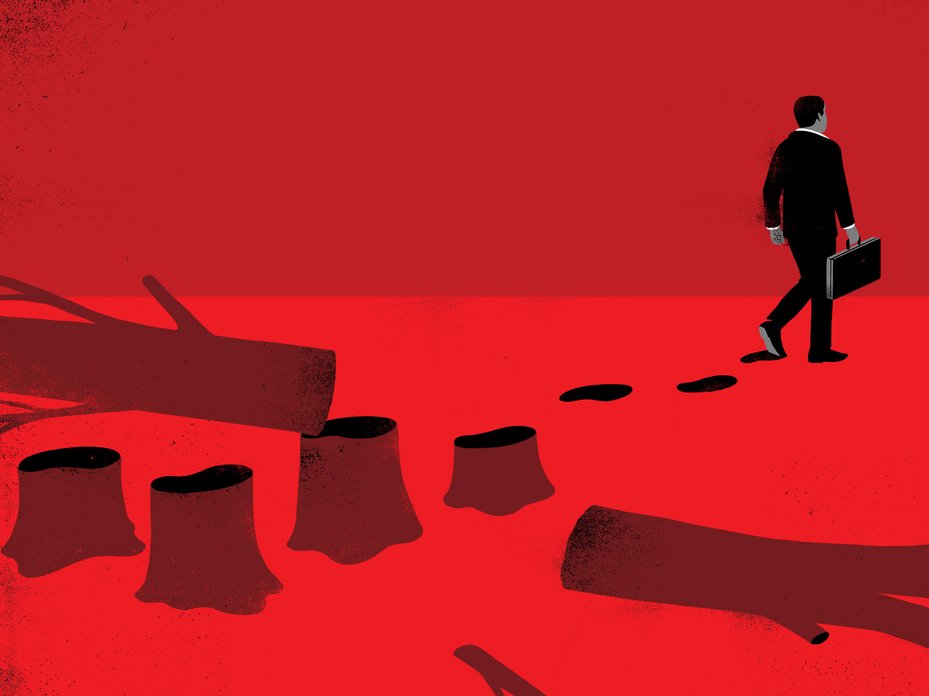
Our research showed how major financial institutions are funding deforestation and walking away with huge profits from the destruction of climate critical forests. Sébastien Thibault / Global Witness
EU moves to back strong measures to tackle EU’s deforestation footprint
Our investigative case studies and report, Money To Burn, highlighted how EU based financial institutions are bankrolling global deforestation.
Throughout 2020, we made the case for EU action to tackle this problem through our policy briefings, research and in the media. This led to a number of other organisations and policy-makers adopting our recommendations, culminating in the European Parliament backing calls for strong measures to tackle the EU’s contribution to global deforestation.
Money to Burn was described by MEPs as “a game changer”. Significantly, their recommendations included the need for new laws to ensure mandatory due diligence on deforestation risk by financial institutions, which sets a high bar of ambition for the European Commission’s legislative proposal due in 2021.
We’re grateful to our supporters who mobilised behind calls for strong EU legislation. Almost 1.2 million people responded to a European Commission consultation calling for new laws to ensure the EU is doing more to end its role in driving deforestation – covering financial institutions as well as supply chains.
This was the second most popular public consultation in the history of the EU, thanks to the network of NGOs we worked with across the EU and globally.
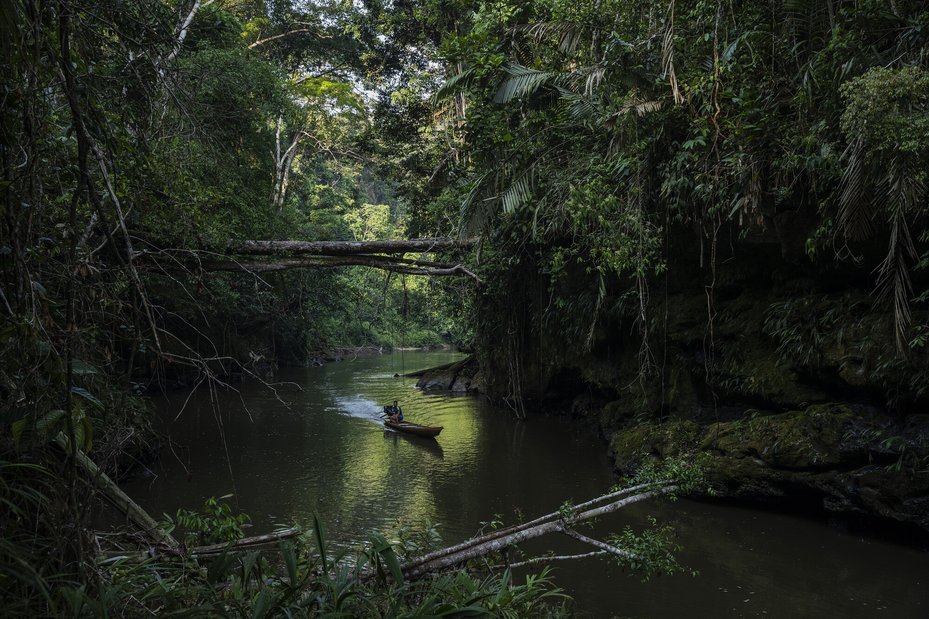
Intact forest and biodiversity in Acre state, Brazil, November 2020. Lalo de Almeida / Panos / Global Witness
Progress to curb big companies tearing up climate critical forests
Our investigation Beef, Banks and the Brazilian Amazon revealed that a chain of actors from cattle ranchers through to multinational beef traders, international financiers, supermarkets and fast-food chains, and the governments that regulate them, are either destroying rainforests or are complicit in the destruction of the Amazon, with flawed audits undertaken by US and European auditors.
Our findings contributed to the work of other civil society organisations to secure a commitment from Brazilian beef giant JBS to monitor indirect beef suppliers for deforestation in their supply chain.
Due to our exposé, the company also blocked one of its prized cattle suppliers that was fined by Brazilian forest enforcement agencies for committing illegal forest clearance, but which had previously escaped JBS’s due diligence procedures.
Meanwhile, in the days after our report was published, it was reported that UK supermarket Morrisons would stop stocking JBS beef.
Separately, Brazilian Federal Prosecutors also agreed to review our evidence in their audits of the company’s compliance with its legal "no deforestation" agreements.
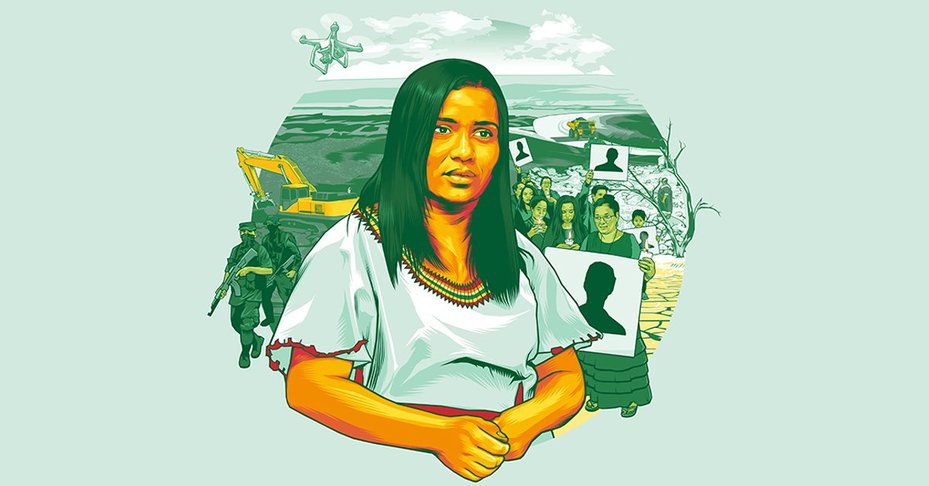
Corporations are leaving a trail of destruction behind them all over the world - destroying wildlife, forestry and riding roughshod over the rights of communities living on the land. Illustration of Angélica Ortiz – Fuerza de Mujeres Wayuu, Colombia. Benjamin Wachenje / Global Witness
Important step forward in holding corporations to account
Last year, the European Commission announced its intention to bring in a potentially groundbreaking new law which would hold companies to account for their human rights abuses and environmental harms.
Global Witness has been campaigning for this since June 2019, with our team helping to create and organise a well-functioning and efficient coalition of NGOs to pool resources, expertise and jointly agree the overarching strategy.
We began with a focused campaign to secure a commitment from the European Commission to take forward this new law, which bore fruit in April 2020, when the European Commissioner for Justice, Didier Reynders, did just that.
Throughout last year, we have been working to provide input and shape the European Parliament Report on Corporate Due Diligence and Corporate Accountability, which establishes the Parliament’s position on the legislation. We successfully made the case for the financial sector to be included, as well as crucial measures to ensure victims of corporate abuse can seek justice.
In October 2020, the European Commission held a public consultation on their planned approach. We partnered with Anti-Slavery International, the Clean Clothes Campaign and Avaaz to ensure the voice of Global South partners was brought directly to the Commission.
To do this, we developed a bespoke consultation tool that allowed global participants to input, generating almost half a million responses.
We organised an event, bringing a Land and Environmental Defender from Colombia and a partner organisation from India to speak directly to the European Commissioner for Justice, highlighting why the law needed strong provisions to ensure companies are obligated to listen to local communities and provide remedy when harms are committed.
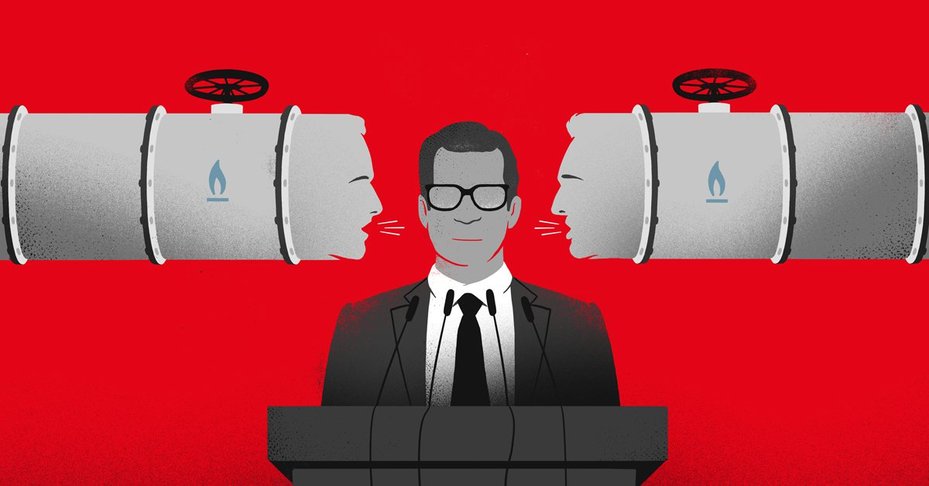
For the world to meet the commitments made at the Paris Climate Summit, the use of fossil gas needs to reduce significantly. Sébastien Thibault / Global Witness
Ending EU support for fossil gas expansion
Following months of pressure from Global Witness, the European Commission took a critical step towards ending the EU’s support for climate-wrecking fossil gas.
The EU has the world’s third highest carbon emissions, behind China and the US, and emissions from fossil gas have now surpassed coal in the bloc.
The Commission argues it is doing its part to fight the climate emergency through the European Green Deal, which aims to reach "net-zero" emissions by 2050. This would require reducing gas use by 90% by 2050.
But in reality, EU law gifts fossil fuel companies huge influence over what gas infrastructure it should support and subsidise – spending billions on projects like pipelines or import terminals that lock us into using too much gas for decades.
Working with allies across Europe, Global Witness spent 2020 campaigning to stop this. Our investigation Pipe Down demonstrated why the EU should end gas companies’ undue influence, showing how they have pocketed nearly 90% of EU subsidies – over €4 billion – in a remarkable conflict of interest.
Following this, our exposé Pyrrhic Victory argued against the futility of building new gas infrastructure. Crunching the numbers, we showed that the proposed EastMed pipeline – which would run from offshore Israel into Europe – would transport more gas than the EU can use while inflaming tensions between Greece, Turkey, and Cyprus.
These findings injected new arguments into the debate surrounding the review of the EU’s infrastructure law, the Trans-European Networks for Energy (TEN-E) Regulation. Our advocacy before Commission officials and members of the European Council and Parliament led to an invitation to join expert consultations on the review.
In December 2020, the Commission published its proposed changes to TEN-E. The EU would no longer support fossil gas projects, the Commission proposed – a major victory. Success has not been absolute, as there is some wiggle room and fossil fuel companies still have too much power.
Entering 2021 we continue our work on this, as the Commission’s proposal is debated by the Council and Parliament, focusing specifically on how much taxpayer money is wasted by Europe’s gas projects and why corporate influence over the EU is so corrosive.
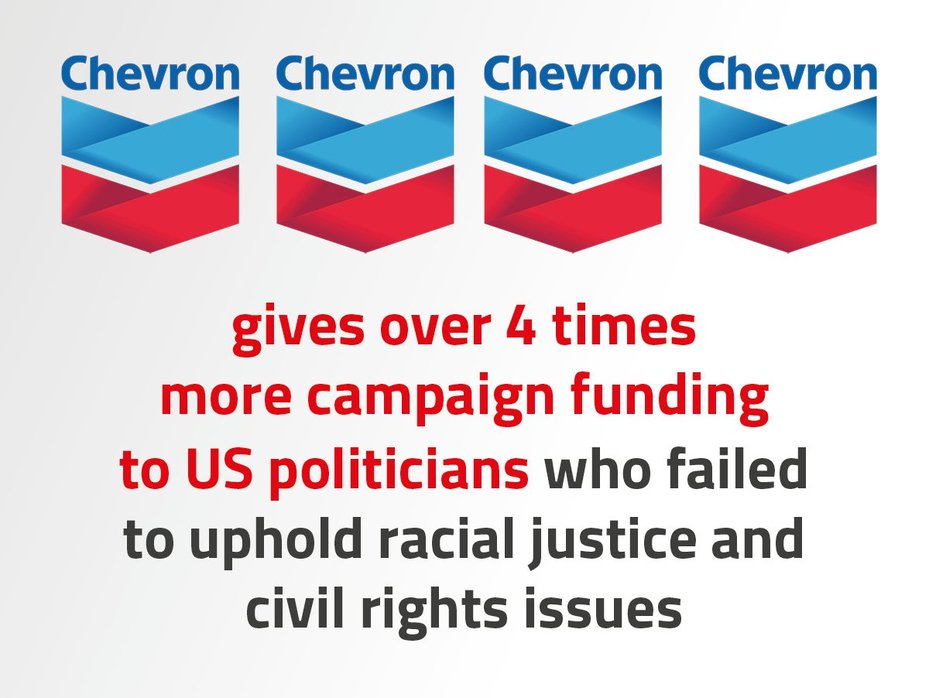
Raising the stakes on corporate hypocrisy and environmental racism
When Chevron used the outpouring of public support for Black Lives Matter to make public statements of solidarity, we exposed how the oil major gives over four times more campaign funding to US politicians who fail to uphold racial justice and civil rights legislation.
Our findings put a spotlight on the fossil fuel industry's blatant hypocrisy, while showing how it props up systemic racism by financing politicians who block progress towards racial justice.
The story has had lasting resonance and impact; it has helped to draw the link between racism and discrimination in the oil and gas industry, and has been utilised in campaigns by our partners to tackle the advertising & PR firms that prop up fossil fuel companies.
Meanwhile, as the US introduced its first bailouts in response to the COVID-19 pandemic, we revealed how one company – Occidental Petroleum – stood to benefit from pandemic relief following intensive lobbying efforts.
This generated national attention on the fossil fuel industry’s influence over political decision-making for their own benefit, at the expense of communities on the frontline of the crisis.
Leading US activist and journalist Bill McKibben highlighted the investigation in his New Yorker column as a spotlight on the “stickiness of the industry’s legacy political power.”
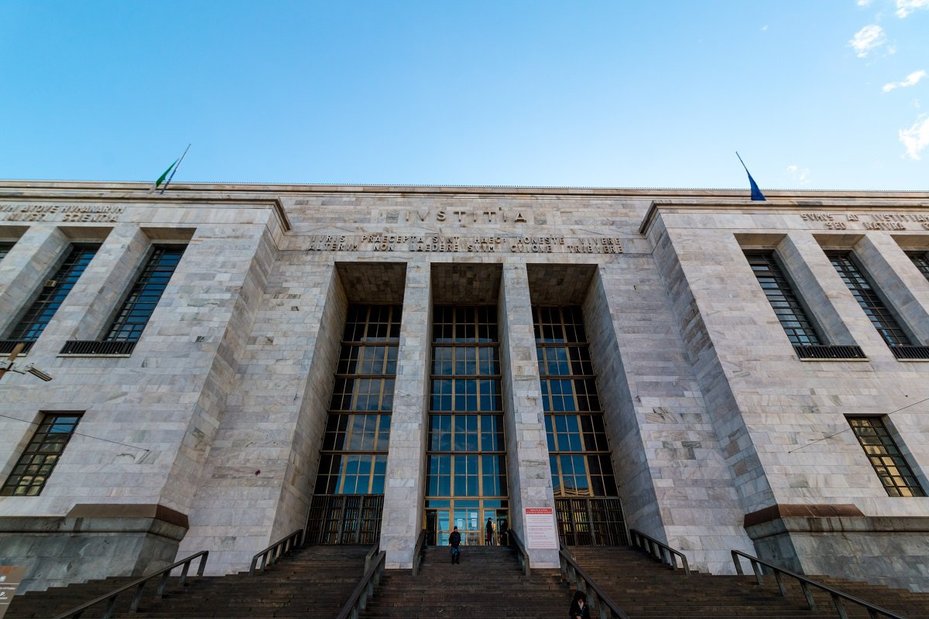
Two of the world's biggest fossil fuel companies faced charges for conspiring to pay bribes as part of their deal to secure a huge Nigerian oil field. Although the verdict came back as Not Guilty, our fight to hold Big Oil to account continues. Barnaby Pace / Global Witness
Fossil fuel companies in the dock
In 2020 two of the world’s biggest fossil fuel companies, Shell and Eni, were on trial in Italy, facing multi-billion dollar penalties and potentially lengthy prison sentences for senior executives from both companies.
The defendants were accused of conspiring to pay over $500 million dollars cash as bribes to officials as part of their deal for a massive Nigerian oil field called OPL 245.
The trial, along with related probes in at least five other countries, were triggered by investigations by Global Witness and our partners in the UK, Nigeria and Italy, including Take the Future, which has been cited to evidence the extent of the harm done. To date, the legal action has resulted in $70m being returned to Nigeria and, in 2020, a private jet was seized and around $120m was frozen.
In a huge disappointment to campaigners in Europe and Nigeria, Shell and Eni were found not guilty by the Italian court in early 2021 and we await the reasons to hear how this decision was reached.
Despite this verdict, there is a possibility of an appeal and criminal trials continue in Nigeria against Shell and Eni’s Nigerian subsidiaries and against the former Nigerian Attorney General, in which they have all pleaded not guilty.
Nigeria has refused to allow the companies to develop the oil field and their license is due to run out in May 2021, making it increasingly likely that the scandal will stop one of Africa’s biggest new oil fields being drilled.
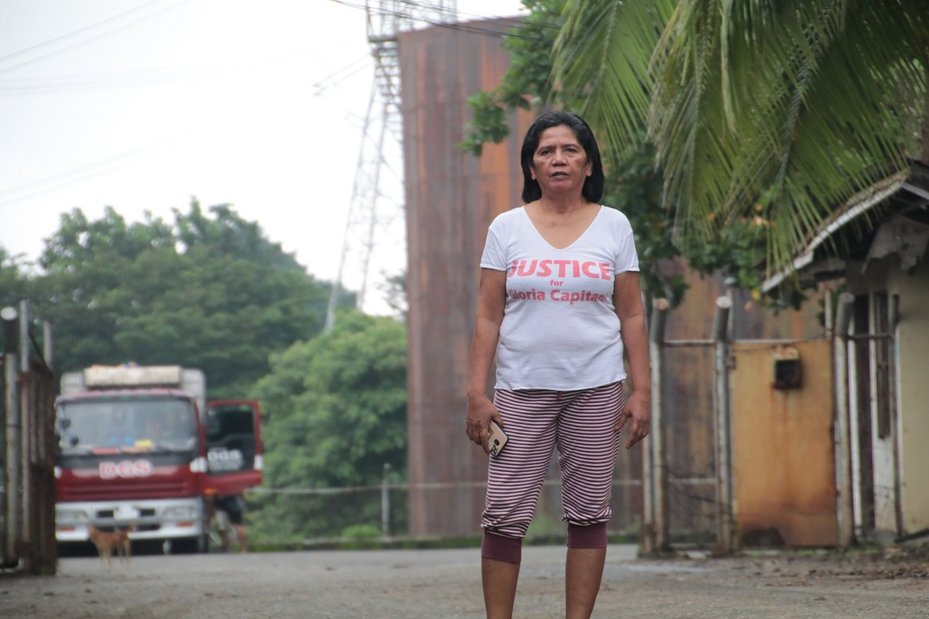
Land and Environmental Defenders in The Philippines face threats and harassment for protecting their homes, their communities and the habitats they live in. Pictured here is the leader of Limay Concerned Citizens, Daisy Pedranza.Global Witness
A global spotlight on Land and Environmental Defenders
Land and environmental defenders play a crucial role in protecting their land, and our climate, against destructive business practices.
Each year, we publish the number of defenders killed, as well as highlighting the other challenges they face, including violent attacks, criminalisation and threats to their families. Our 2020 Annual Report showed 212 defenders had been killed in the previous year, the highest number since we began recording this information in 2012.
We were able to bring global attention to this terrible atrocity, as well as shining a spotlight on the work of our partners, particularly those from indigenous communities, who are often facing some of the most brutal responses to their campaigns to safeguard their land.
We received over 1,000 media hits with a potential reach of over 3 billion and our content was shared by global climate leaders, including Greta Thunberg and Greenpeace, as well as international media, including CNN, the BBC and TIME.
We hear from defenders that this kind of awareness-raising is an important role Global Witness can play, as it makes it harder for governments and companies to ignore their campaigns and can, at times, offer a layer of protection against state and corporate-sanctioned violence.
Our investigative report, Trading Risks, uncovered how two major US commodity traders, ADM and Bunge, failed to ensure that the Indonesian palm oil mills they source from are free from abuse against land and environmental defenders.
Following this, ADM initiated an initial investigation into all of the mills identified as problematic in the report. They have already added nine of these on to their grievance list and committed to further investigating an additional 36 mills.
Wilmar, the world's largest palm oil producer, which was also implicated in our report, committed to developing a “standalone Human Rights Defender policy.”
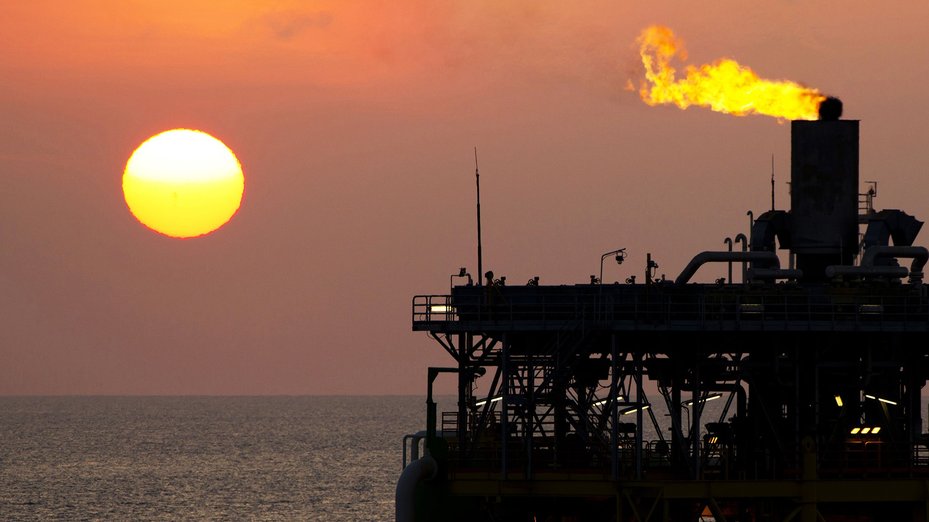
Claffra / iStockPhoto
Spotlight on national oil companies and hidden debt
Republic of Congo, Sub-Saharan Africa’s third largest oil producer, faces bankruptcy, receiving multiple multi-million dollar bailouts from the IMF after its leaders have siphoned off its wealth.
Our report, Rigged: Where has Republic of Congo’s oil money gone, analysed previously hidden accounts and oil contracts related to the country’s national oil company, SNPC. We revealed apparent abusive commercial practices by foreign oil companies and millions of dollars in missing funds.
In particular, we found that SNPC is carrying billions of dollars in previously undisclosed oil-backed liabilities. Further to our report, the IMF committed to consider this type of debt in their future analyses.
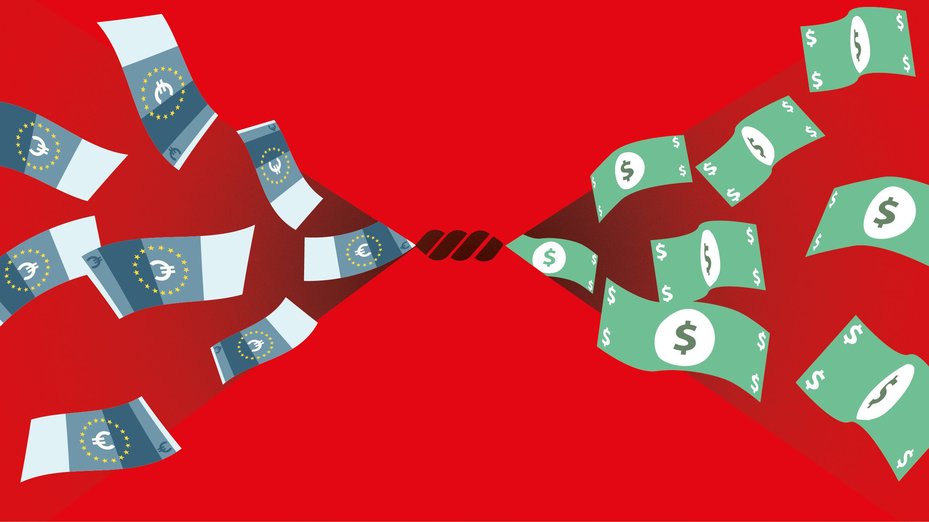
Taking on the bad guys
Our investigation Undermining Sanctions revealed how Israeli billionaire and mining magnate Dan Gertler may have evaded US sanctions over corruption in the Democratic Republic of Congo (DRC) which were then in force against him and acquired new mining assets.
The publication forced Gertler and allies to come out of the shadows and respond publicly to our allegations, which they denied. They have since mounted unprecedented smear and legal campaigns against us and our partner in the investigation, the Platform to Protect Whistleblowers in Africa.
All of this has created controversy around Gertler’s character, and a strong call for accountability in the DRC and abroad. In the DRC, civil society movements have been emboldened to advocate on matters related to corruption and have called out the government to scrutinize Dan Gertler’s deals in their country and to return revenues from the mining sector to the Congolese people.
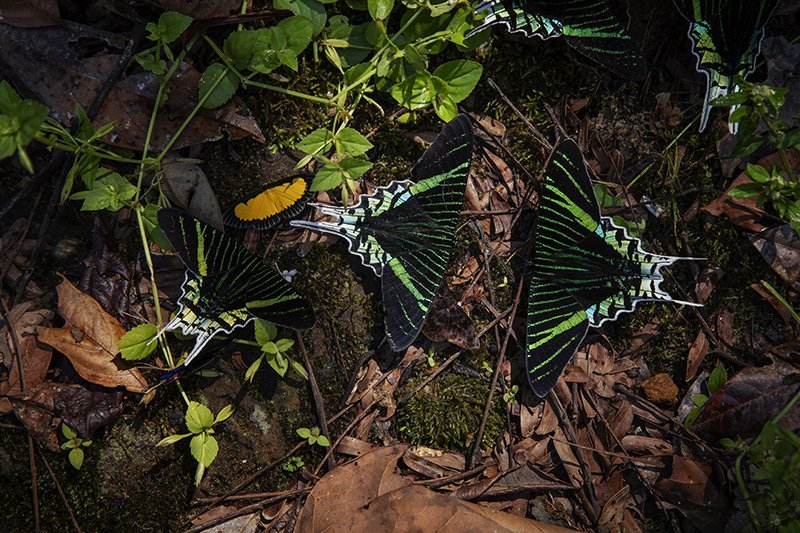
Climate critical forests are essential if we are to restrict global warming, yet our investigation showed how illegal deforestation remains rife in the Amazon. Lalo de Almeida/Panos/Global Witness
Believing the impossible
Global Witness is ambitious. Our campaigns aim to create a real step change in addressing some of the underlying causes of global warming. We are not in the business of tinkering at the edges. We want a new economic landscape in which people and planet take priority. We know systemic change is difficult to achieve, but we also know that it is possible.
That’s why, in the face of day after day of depressing headlines about the progress being made to address the climate crisis, we remain optimistic that the climate movement will ultimately succeed.
As part of that growing and powerful collective, we bring our experience of establishing campaigns on issues that people told us again and again would not be possible to achieve. Along with our investigative, advocacy and communications skills, we also bring determination, persistence and resolve!
We know that long-lasting change – the kind that will touch not just thousands of lives, but millions, and have global impact – is not always easy to secure. It can take years to build a case, create a strong evidence base, form partnerships, and identify key advocates.
In 2020, two of our long-running campaigns did secure real victories. When we first started working on the issue of stopping people from owning companies anonymously, a well-known route for channelling the proceeds of crime and corruption, we were told there was no chance of success.
Similarly, when we launched our campaign to stop the UK financing fossil fuel exploration overseas, we were told this would never be a priority. And yet last year, huge steps forward were achieved in both areas.
We asked Nienke Palstra, Senior Campaigner, and Dominic Kavakeb, Senior Communications Advisor, to outline in a bit more detail how Global Witness helped achieve “impossible wins” in 2020.
Ending the “worst problem you’ve never heard of”: The campaign to stop the use of anonymously-owned companies
For over a decade Global Witness has been at the forefront of the campaign to end anonymous companies – the getaway cars for the criminal and corrupt all over the world.
We saw this problem routinely come up in our own investigations, preventing not just us but also law enforcement from following the dirty money trail. As we delved deeper, we discovered it was extremely easy for the corrupt to hide and move money around the world.
All too often the companies involved were incorporated in offshore tax havens but also in the US, UK and EU Member States.
At the heart of this problem, there is a serious human cost, depriving some of the most resource-rich countries of the wealth needed to tackle poverty and save lives.
We uncovered how the people of the Democratic Republic of Congo lost out on billions of dollars of revenue when their copper and cobalt mines were sold at a fraction of their real value via opaque companies incorporated in the British Virgin Islands.
With investigators unable to track down the real human beings behind the money, there was little opportunity for justice or to disincentivise others from doing the same.
It was time for a global wake-up call and to tackle the root of the problem: forcing companies to disclose their real owners through regulation.
Over the past decade, Global Witness has played a leading role in exposing the problem and pushing for change with a strong coalition of other CSOs, journalists, and parliamentarians.
In 2014, Global Witness Founder Charmian Gooch was awarded the TED prize in support of the campaign to end anonymous companies, garnering support from law enforcement and business leaders worldwide.
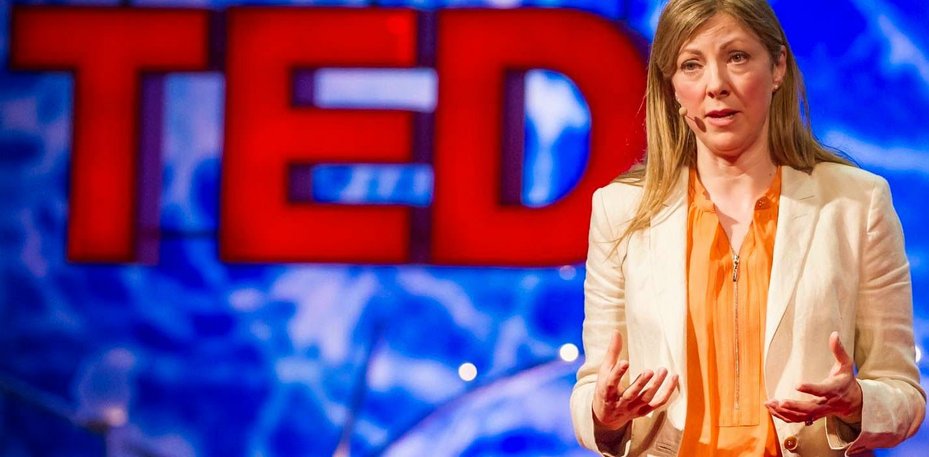
Charmian Gooch delivering her prize-winning TED talk on anonymous companies in 2014. TED
From once being “the worst problem you’ve never heard of,” we’ve seen a tidal shift in the fight against anonymous company ownership. Thanks to Global Witness’s investigations, storytelling and dogged campaigning we’ve played a big role in this.
Our first breakthrough came in 2013, when the UK first committed to setting up a register of the real owners behind companies, and later decided to make it fully open to the public.
Spurred on by the revelations of the Panama Papers, the EU quickly followed suit, revising its anti-money laundering rules to require public registers in all 28 EU Member States.
In April 2018, we contributed to another watershed moment when a cross party group of parliamentarians, armed with our research and investigations, forced the government to pass legislation requiring the UK’s Overseas Territories to create such registers by 2020 – bringing change to some of the worst financial secrecy hotspots like the Cayman Islands and British Virgin Islands.
The following year, the UK’s Crown Dependencies – Jersey, Guernsey and the Isle of Man – made a similar commitment to open up.
The US was always a key jurisdiction for us: one of the easiest places in the world to set up an anonymously-owned company, with rules that were even more slack than those of the British Virgin Islands and where opposition to transparency was strong.
If we were unsuccessful in securing meaningful change in the US, a huge gap for tackling anonymous companies would remain.
Over this period, Global Witness kept a steady drumbeat of pressure in the US via hard-hitting investigations and by building a broad, bipartisan coalition including national security groups, human rights organisations, law enforcement, the real estate sector, labor unions, financial services, and the business community.
Finally in December 2020, in one of its final acts of the year, Congress passed a historic provision requiring companies to disclose their true owners to authorities – it had been over 10 years in the making. While this falls short of public disclosure, it presents a crucial step in the right direction.
The impact of transparency is now becoming more apparent. We've seen a steady stream of new public interest investigations made possible by having this information available, including earlier this year which saw revelations around Luxembourg’s secretive offshore industry. Meanwhile, the countries resisting transparency look increasingly isolated.
Looking ahead, there are more battles to fight, not least getting more countries to follow suit, improving the efficacy of the registers and extending transparency to trusts. Fortunately there are more organisations than ever involved in this endeavour, and we’ve helped build some of the important platforms that will take this work forward – including OpenOwnership, the Financial Transparency Coalition and FACT Coalition in the US.
For a campaign that was once seen as hopelessly unrealistic by many policymakers, we have gone a long way - not yet entirely destroying all the getaway cars for the criminal and corrupt, but steadily reducing the number of them and how fast they can drive.
Nienke Palstra, Senior Campaigner
The UK’s dirty footprint overseas: Ending fossil fuel exports
"My god, your country really does export nothing but weapons and pollution.”
Slight over-simplification aside, this comment from a journalist at a well-known UK broadsheet was a very stark reminder of the absurdity of the UK extolling its climate credentials on the one hand, whilst exporting fossil fuels around the world with the other.
This is something that, in just three years, Global Witness and its partners succeeded in reversing through a campaign that blended targeted advocacy and a drumbeat of strong and far-reaching communications.
In 2018, lots of us at Global Witness were starting to recognise the UK’s role in exporting CO2 emissions. At around the same time, news was emerging that the government was planning to support a huge oil refinery in Bahrain.
For decades, chiefly through UK Export Finance (UKEF) – the UK’s credit agency which underwrites loans and insurance for risky export deals as part of efforts to boost international trade – Britain had been pumping public money into major fossil fuels projects overseas.
In addition to UKEF, the UK was also backing fossil fuels via its overseas aid, contributing to around £21 billion of support through a combination trade or export finance between 2016 and 2020.
Not only is there the immediate environmental damage caused by these projects, the UK’s financial support can force countries into “dirty development” where economies rely on the success of this infrastructure for decades to come.
It also provides the companies involved with massively decreased risk, enabling the long-term financial viability of fossil fuels, at a time when the world most certainly needs to be curbing the power and reach of the fossil fuel industry.
Faced with an expensive, long-term and catastrophic problem, Global Witness set about a campaign to do something about it – despite our campaigners being told it was an “impossible win” and would be better off left alone.
We started by trying to force a parliamentary inquiry into the issue. Despite a knock back from the International Trade Committee, the Environmental Audit Committee agreed to take this on. Global Witness both presented evidence, as well as briefing the MPs asking the questions.
It concluded with a strong set of recommendations that crucially included a 2020 deadline for the UK to stop funding fossil fuels overseas.
Backed by strong parliamentary support, attention turned to securing wide-ranging and mainstream media coverage to keep hammering the point home. As part of this, we secured a BBC Newsnight segment, featuring a Global Witness spokesperson, that we helped to shape.
Capitalising on this interest, we launched a number of smaller initiatives and reports to keep a regular drumbeat of pressure, including an OECD complaint, analysis of UKEF’s hospitality records and a report looking at other government agencies responsible for funding fossil fuels.
Towards the end of 2020 it was increasingly becoming clear that a victory was possible, although there was still a possibility that other political priorities might kick this into the long grass.
However, at the very end of the year, a formal announcement was made – the UK would end all fossil fuels funding overseas. Some small loopholes remain and will need to be worked on but this is a huge step in the right direction.
Dominic Kavakeb, Senior Communications Advisor
Learning, developing, evolving
As an organisation, we are always looking to improve the way we work. In the last few years, we have particularly focused on expanding our capacity to analyse and share data as part of our investigative work, and our approach to building long-term, sustainable and equal partnerships with organisations, particularly in the Global South, which share our commitment to protecting the climate and safeguarding human rights.
In this section, our Head of Data Investigations outlines the analysis carried out to uncover the extent of deforestation in the Brazilian Amazon driven by cattle farming, and campaigners in our Land and Environmental Defenders Campaign share details of a partnership programme that was established to support stronger communications on the ongoing battles being waged by environmental activists across the world.
Uncovering the illegal deforestation linked to Brazil’s biggest beef companies
At the end of 2020, we published Beef, Banks and the Brazilian Amazon. It was the culmination of over a year of research and was our most ambitious data-driven investigation to date.
Work on the report began in 2019 when the Forests and Data Investigations teams set themselves the goal of mapping Brazil’s largest beef companies’ supply chains using only public records to see if they sourced cattle from ranches associated with deforestation.
For the three previous years, auditors had awarded the beef companies in question – JBS, Marfrig and Minerva – clean bills of health. Yet, there was anecdotal evidence that the major beef companies were not playing by the rules.
Our analysis sought to take a birds-eye view of this, looking in detail at the beef companies’ supply chains within Pará, the Brazilian state with the largest cattle herd and a hotspot for deforestation.
The results were shocking. The report ultimately revealed how Brazil’s biggest beef trading companies are linked to tens of thousands of hectares of illegal deforestation. Despite the auditors saying otherwise, our analysis shows how the firms’ suppliers – both direct and indirect – are deliberately flouting the law, with the companies themselves apparently turning a blind eye.
To conduct this analysis, Global Witness’s Data Investigations Team had to build a picture of the beef traders’ supply chains.
We used documents called animal transit guides (GTAs), filed by ranches with the Pará state agriculture agency when they move animals around – for example, when selling cows for slaughter or export. The GTAs are available to consult one-by-one through an online portal.
By guessing the documents’ ID numbers and automating the process with a technique known as web scraping, we were able to obtain more than three million GTAs dating from 2014 to 2020.
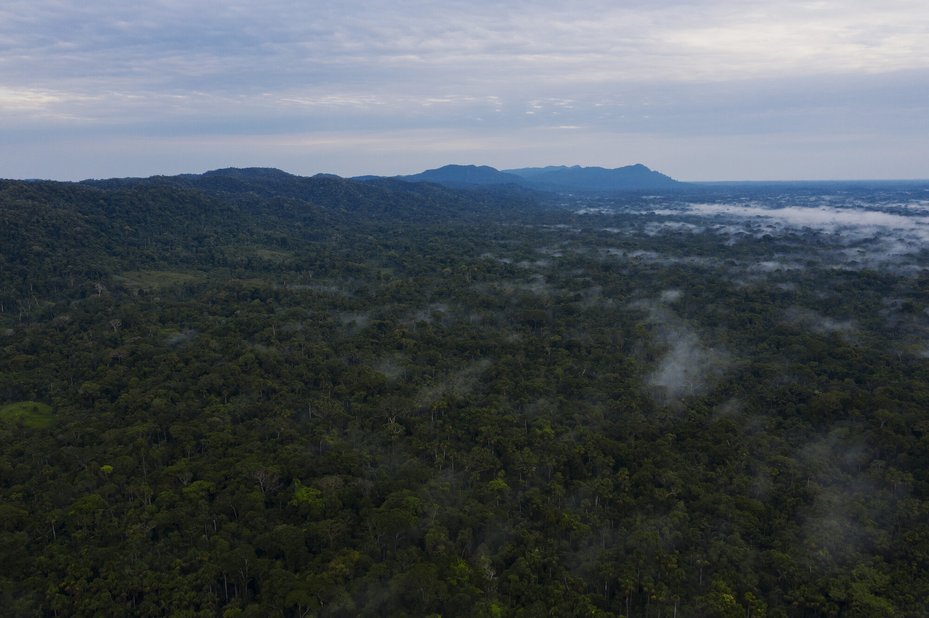
Our report used publicly available records and satellite imagery to show how some of the biggest producers of meat were complicit in illegal deforestation through their supply chains. Lalo de Almeida/Panos/Global Witness
Animal transit guides are just one piece of the puzzle. To quantify deforestation, Global Witness used a data set called PRODES, published by Brazil’s federal space agency, which shows areas of deforestation detected in satellite imagery.
We then overlaid this data with information from the Pará state rural environmental register (CAR), which shows the boundaries of ranches, self-reported by their owners.
The three data sources were combined automatically to throw up a series of suspect ranches, which were then investigated manually by Global Witness researchers.
The data analysis exposed the systemic nature of illegal sourcing of cattle within the Brazilian beef industry. It also proved that it’s possible to quantify deforestation in beef companies’ supply chains using publicly available data combined with free, open-source tools.
The fact that Global Witness’s small Data Investigations Team was able to do this is an essential lesson for auditors, financial institutions, and the companies themselves, which sometimes claim there is insufficient data to monitor and assess environmental risk in supply chains effectively.
Sam Leon, Head of Data Investigations
Launching a new strategic awareness raising programme
Over the years, our Land and Environmental Defenders campaign has built long-standing relationships with affected communities across the world and has become part of a global movement of people seeking an end to environmental harms and attacks against the communities that protect our planet.
We recognise that much of our data collection and campaigning is strengthened by our relationships with national and local level organisations. To build on this, we created our Strategic Awareness Raising Programme (SARP) in 2020 to strengthen our partnerships with defenders.
Our programme seeks to balance the needs of our campaign with those of partners organisations by fostering an equitable relationship with those we work with. We collaborated closely with eight organisations to raise awareness of the root causes and threats facing land and environmental defenders from Latin America, to Africa and Asia.
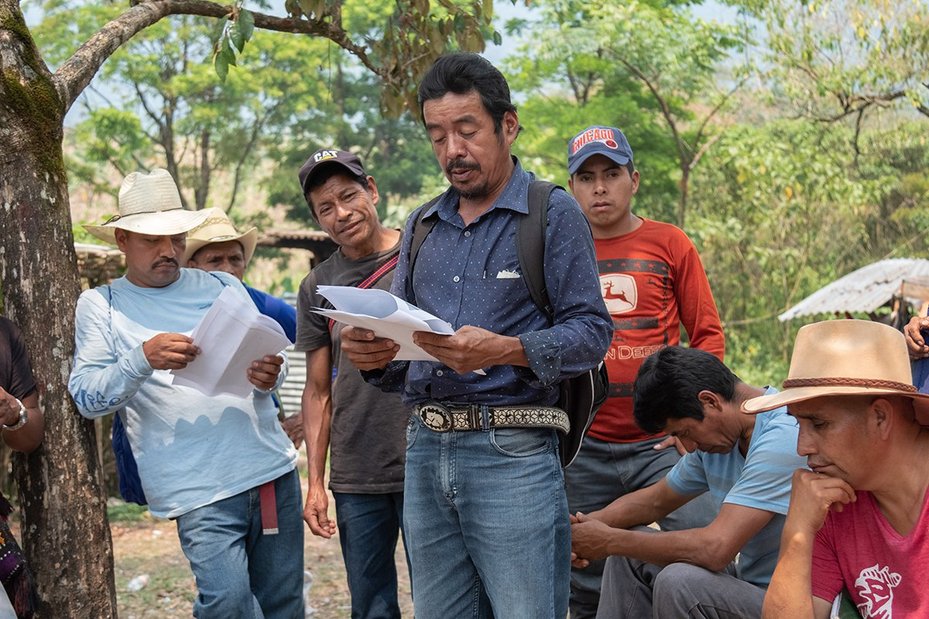
Francisco Morales, from Bella Linda and member of the Ixquisis Peaceful Resistance against the San Mateo Hydroelectric Project, reads a document to others gathered for a meeting in Guatemala. James Rodriguez / Global Witness
It was possible to give greater visibility to the work we do on human rights defenders, as Global Witness supported us by spreading our issues on their social media outlets. GW also helped us establish contacts with social organisations and international media, as well as opening a space for us on its blog to reflect on the lack of resources allocated by the Mexican State for the protection of defenders
Over 10 months, the SARP provided financial support and technical advice across a range of partner-driven advocacy and communications activities.
In the Philippines, we worked with our data partner to deliver their first 100% digital campaign, highlighting the climate and human rights impacts of the mining industry.
A documentation project led by our Guatemalan partner resulted in a creative digital campaign that reached over 75,000 social media users, shedding light on the challenges defenders were facing as a result of the pandemic.
Whilst in Africa, our partner worked to raise the profile of land and environmental defenders by publishing unique case studies tackling underreporting of the work being carried out to protect land in North Africa.
Each project was designed in collaboration with the Defenders team at Global Witness, and responded to the strategic needs and local impacts faced by defenders and their communities.
This project demonstrated the capacity that can be achieved to generate new forms of communication, and it also allowed us to evaluate –although that was not its objective– how we develop it within our organisation. Thanks to that, we realised we need to continuously strengthen the communications advisor’s capacities, as well as the need to incorporate another one to support in achieving the objectives
Over the year, we also delivered three workshops – attended by 65 defenders – which covered a range of issues from the documentation of threats and attacks to harnessing the strength of social media, and a session on building communications strategies and narratives.
These partnerships are central to achieving our goal of a world where defenders rights are respected, and they can speak out safely, freely and self-advocate with impact.
Rachel Cox, Campaigner, Land and Environmental Defenders
Francisca Stuardo, Civil Society Advisor
Adapting in a fast changing world
The COVID-19 pandemic has altered the way all organisations work. Alongside this, shifts in our campaigning priorities to more directly address the climate emergency, and a fresh leadership team, has led to a period of reflection for us at Global Witness about the values we share, the culture we build and how that shapes the kind of organisation we are.
Our HR Director, Nadia Bunyan, takes us behind the scenes to show how we have created a new Global Witness story to ensure we’re ready to take on the major challenges of the modern world.
2020: An internal perspective
Nadia Bunyan, HR Director
The world has changed significantly since Global Witness first took up its mission. We entered 2020 feeling that we were standing at the precipice of determining our significance for the next 25 years.
With new campaign strategic priorities and a newly appointed CEO it was time to consider how we would create a culture which contributed to keeping us relevant and sustainable so we could continue to contribute to solving the biggest problems that the world faces.
This prompted a period of deep reflection for Global Witness’s leadership team. How should Global Witness adapt to a world that is increasingly volatile, uncertain and complex?
Our conclusion was that for us to continue to succeed we needed to embody the principles we are fighting for by striving for greater cohesion, solidarity and inclusion internally and that everyone across the organisation needed to come together to pull towards a shared goal.
What we couldn’t have planned for, as we started to plot our path to change, is that we would need to adapt and respond to unchartered challenges for our people and our work as the global pandemic brought the shutters down on life as we knew it.
Pulling together: Global Witness story and values
We brought everyone across the organisation together to create a new story for Global Witness based on the following questions:
- Why do we need to be different?
- What is the unique difference that Global Witness makes to the world?
- What are the challenges we face internally and externally that we must acknowledge?
- How do we need to act to make sure we are pulling together as one organisation to make the difference?
This collective team effort resulted in the ‘Global Witness Story’ and a set of new organisational values: courage, kindness, inclusion and belonging, and collaboration.
We are now using the Story every day in lots of different ways – it helps us describe who we are and what we stand for as an organisation, as well as being key to developing a more consistent employer brand.
We know that culture change is difficult and takes time. We are cautious about declaring victory too early. Our current priority is bringing our new values to life and making sure they are reflected in our everyday interactions with each other and the people and organisations externally that are important to us.
Our commitments to racial justice
In May 2020 following the killing of George Floyd the world began to open its eyes to the depth and scale of racial injustice.
While in recent years we have taken steps and made changes by recognising that we are part of a problematic disconnect between wanting a better world whilst continuing to operate in a way that fails to confront damaging aspects of the status quo and, at times, makes it worse.
But the reality is that we have more to do when it comes to racial justice.
On 11 June 2020 we publicly acknowledged our role in propagating racism and legacies of oppression and set out four organisational commitments to racial justice.
- Diversity & Inclusion accountability: Time and resources within job roles have been allocated for the creation of a Diversity and Inclusion Advisory Group who will play a leading role in our aspiration to be more diverse and an organisation in which everyone feels included and belongs
- Safe spaces: We are creating safe spaces for staff of colour and minority groups with the highest priority focused on strengthening safe spaces for Black staff.
- Recruitment review: We are reviewing our end to end recruitment processes. From considering whether the language we use in job posts is exclusive through to challenging ourselves on how jobs can be done.
- Campaign successes: We often work on the same issues as local partners or communities and we must do more to ensure that our investigations and campaign goals are formed with them in mind. We are beginning to report on how well a campaign includes local partners, how it amplifies voices, and how it supports the advocacy goals of local communities.
In July 2021 we will report on the progress we have made on these commitments and how we have improved our working culture.
2020 certainly was a year of change, challenge and opportunity for Global Witness and its people. While the world remains unpredictable, complex and ambiguous, we entered 2021 with a sense of optimism and excitement about our place in the world.
Looking to the future
By Seema Joshi, Director of Campaigns
Last year was a whirlwind for me. I took on the role of Director of Campaigns just as the UK went into lockdown for the first time. I’ve barely met my colleagues in person and have been introduced to Global Witness’s new campaigns through many, many hours of zoom calls!
This is my second stint at the organisation, having worked some years ago on ending corporate impunity for abusive mining and timber trading practices linked to armed conflict.
I have been inspired, excited and sometimes a little daunted by Global Witness’s decision to shift away from high impact, but ultimately regional or resource-specific campaigns, to focusing on the underlying and global causes of some of the biggest challenges facing the world; namely the climate crisis and the closure of civic space.
No longer content with bringing transparency to the oil and gas industry, we now want to end it and keep fossil fuels in the ground.
Not satisfied with better oversight of logging companies, we now want to stop the deforestation of climate critical tropical forests and keep trees standing.
Not comfortable with taking on one or two of the biggest and most powerful companies, we are now pushing for new laws to hold all corporations, including financial institutions, to account for their impact on the environment and infringements on human rights.
In this we join a growing movement of climate activists, community leaders, land and environmental defenders and young campaigners calling for an end to the global paralysis of world leaders in the face of the devastation being wrought by global warming.
Never has this work been more urgent. At the end of 2021, the next major climate summit, COP26, will be held in Glasgow.
Ahead of this, Global Witness will be calling on policy-makers to finally confront the predatory economic model that is destroying the planet and take the bold political decisions needed to build a better, more sustainable future for generations to come.
At a basic level, that means governments rejecting advice or campaign funds from polluting fossil fuel companies, not sharing a platform with the banks financing deforestation, and calling out the greenwashing that allows companies to position themselves as "eco-friendly" whilst not taking real action to address the fundamentals of their business model.
We will be calling out the corporations that have spent decades – and millions of dollars – on research, PR campaigns and political influencing to distract us away from meaningful systemic change, cutting emissions and achieving 1.5°C of global warming.
These actors will destroy our planet and humanity unless their power and influence are nullified as illegitimate. There should be no room for them at COP26, nor indeed at any discussion about the future of the global economy, the societies we hope to create, or the actions needed to stop the planet heating to unsustainable levels.
The summit needs to build the foundations for a new era where companies are held accountable for their impact on the environment and local communities unjustly impacted.
At Global Witness, we will particularly be training our laser-like focus on the nefarious role of investors – big banks, funds and private investors alike – driving trillions of dollars into industries that damage the planet and undermine human rights abuses.
Cutting off these sources of funding and pushing for them to be re-directed towards more ethical projects will be like removing a poisonous drip from a patient’s arm and replacing it with an antidote. It will allow nature to heal, giving space and power to those whose lives and livelihoods are linked to the protection of the land.
Ahead of the gathering of leaders in November, we will be working to ensure the voices of those most affected by the ongoing climate emergency, including land and environmental defenders and indigenous communities, are front and centre of the conversations about how we move forward.
Youth, women and vulnerable communities, including in the global South, are disproportionately affected by the climate crisis. We will prioritise environmental justice as part of the global roadmap toward economic recovery and climate action.
To uphold these ambitions, leaders and big business cannot ignore the power imbalance, inequities, and disproportionate human and social costs for communities that bear the brunt of continued oil and gas extraction, including through fossil fuel exports by major superpowers, as well as the toxic pollution emitted from processing facilities like export terminals.
For COP26 to make history, we need to see it lay the foundations for global change. This cannot be a moment for more of the same, empty promises, or vacuous statements that can’t be backed up with immediate action.
Looking across the issues Global Witness is campaigning on, and which gained such momentum in 2020, we will now work to lift our sights even higher, setting new ambitions for the organisation. In 2021, we will be striving towards:
- Ending unaccountable corporate power so that illegitimate actors can no longer detract us from hitting 1.5 degrees Celsius
- Ending investment with impunity by cutting off access to financing for projects and industries devastating the planet and undermining human rights. In parallel, we will look to promote investment moving to real, impactful and equitable solutions at a global level
- Democratising the debate on the future of our planet
- Keeping fossil fuels in the ground
- Protecting civic freedoms, countering the spread of hate, polarisation and disinformation
- Championing a just and equitable transition to meet the Paris Climate Goals
- Advancing our values, leading and aligning with global partners and social movements on climate justice
We know we can’t achieve change on our own. Collaboration will be at the heart of everything we do. We are incredibly grateful to the many individuals and organisations who went before us and forged a path to victory through environmental activism and climate campaigning, as well as those who now support our work and share our mission.
It’s a long road ahead to secure the action needed to save the planet and its people, but I know 2021 will see Global Witness’s contribution to this all-important goal grow even further.
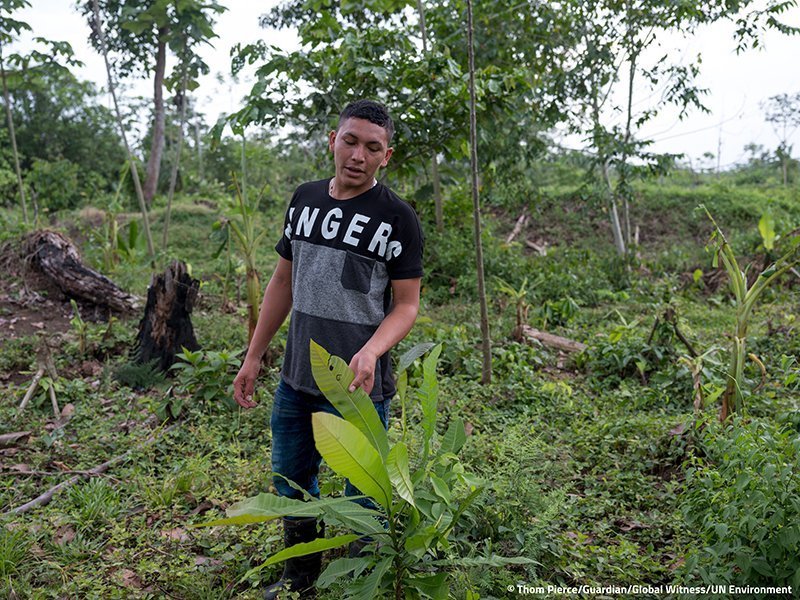
When paramilitaries murdered his father in December 2017, eighteen-year-old Ramón Bedoya inherited the struggle against palm oil plantations who want to develop an area covering his family's land and a biodiversity zone. Thom Pierce / Guardian / Global Witness / UN Environment
Thank you to all our supporters
Global Witness is a non-profit organisation that relies on the generosity of our supporters and partners to continue our tireless investigations, exposés and advocacy. Without your support, the victories we have won against conflict finance, corruption, human rights abuses and environmental destruction would never have been achieved.
The devastating impacts of the climate crisis are becoming ever starker and more difficult to ignore. We have shifted our approach to address the crisis more directly at hand.
In the coming years, we will bring our investigative, campaigning and communications skills to uncover the role corporations and financial institutions are playing in undermining efforts to stop climate change and their attempts to muddy the waters on what will make a difference in the protection of our planet.
On fossil fuels, our focus will be on ending the myth that fossil gas is the answer to the climate crisis.
We will work to end the ongoing decimation of climate-critical tropical forests completely.
We will work to end the killing of land and environmental defenders, address the underlying causes of attacks against them, and ensure those who commit or are complicit in violence against them face the full force of national or international law.
We will campaign for a corporate accountability law that enshrines a set of global standards that can be enforced to ensure the future of our planet is safeguarded from rapacious profit-makers and investors
Thank you for your continued support and for helping us protect our global climate and environment for future generations, while safeguarding people’s rights to their land and livelihoods.
If you’d like further information or to discuss how you can support our campaigns further, you can contact us at [email protected] or donate online now
Donors
- The Adessium Foundation
- The Alexander Soros Foundation
- Arcadia Fund – a charitable trust of Lisbet Rausing and Peter Baldwin
- Arcus Foundation
- Arnhold Foundation
- Ashden Trust
- Brook Foundation
- CHARISMA Stiftung für nachhaltige Entwicklung
- Climate Change Collaboration
- (Mark Leonard Trust, Ashden Trust and JJ Charitable Trust)
- Department of Foreign Affairs and Trade, Ireland
- Don Quixote Foundation
- The Edward Hoare Charitable Fund
- European Climate Foundation
- Evan Cornish Foundation
- Ford Foundation
- The Foundation to Promote Open Society
- The Frederick Mulder Foundation
- Henocq Law Trust
- The Horace W. Goldsmith Foundation
- Humanity United Action
- Hopewell Fund
- Jane Thurnell-Read
- The Kestrelman Trust
- Luminate
- Mike Servent
- The Minor Foundation for Major Challenges
- Nationale Postcode Loterij
- Northern Trust Corporation
- Norwegian Agency for Development Cooperation (NORAD)
- Oak Foundation
- Postcode Planet Trust, supported by players of People’s Postcode Lottery
- The Reed Foundation
- Seattle International Foundation
- Silicon Valley Community Foundation
- Skoll Foundation
- Swedish Postcode Foundation
- Taylour Foundation
- Tilia Fund
- UK DFID- Forests, Governance, Market and Climate Programme
- Wallace Global Fund
- The Waterloo Foundation
- The William and Flora Hewlett Foundation
- Wyn & Ken Lo Memorial Foundation
*These are the donors that have given their consent to have their gift acknowledged in our Annual Report.
Board of Directors
- Patrick Alley
- Chinmayi Arun (resigned
- 10 December 2020)
- Gabrielle Darbyshire
- Charmian Gooch
- Mark Hannam (resigned
- 21 September 2020)
- Fatima Hassan
- Juana Kweitel (Chair- appointed March 2021)
- Mark Stephens CBE (resigned
- 22 September 2020)
- Simon Taylor
- Advisory Council
- Bennett Freeman
- Misha Glenny
- Victor Lopez Illescas
- Camille Massey
- Bandi Mbubi
- Arlene McCarthy OBE
- Christopher Mitchell
- Aryeh Neier (Honorary chair)
- Anita Ramasastry
- Silas Siakor
- Mabel Van Oranje (Chair)
- Edward Zwick
Trustees of Global Witness Trust (UK)
- Jeremy Bristow
- Caroline Digby
- Christopher Mitchell (Chair)
- Tony Stevenson
Directors of Global Witness Foundation (US)
- Patrick Alley
- Bennett Freeman
- Stafford Matthews (President)
Income and expenditure statement
For the year ended 31 December (in £ thousands)
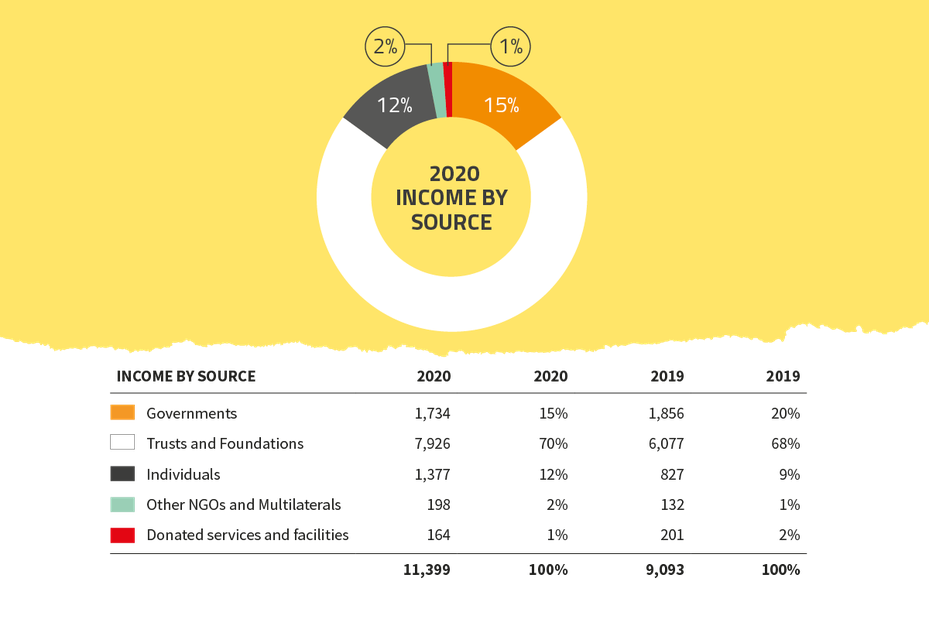
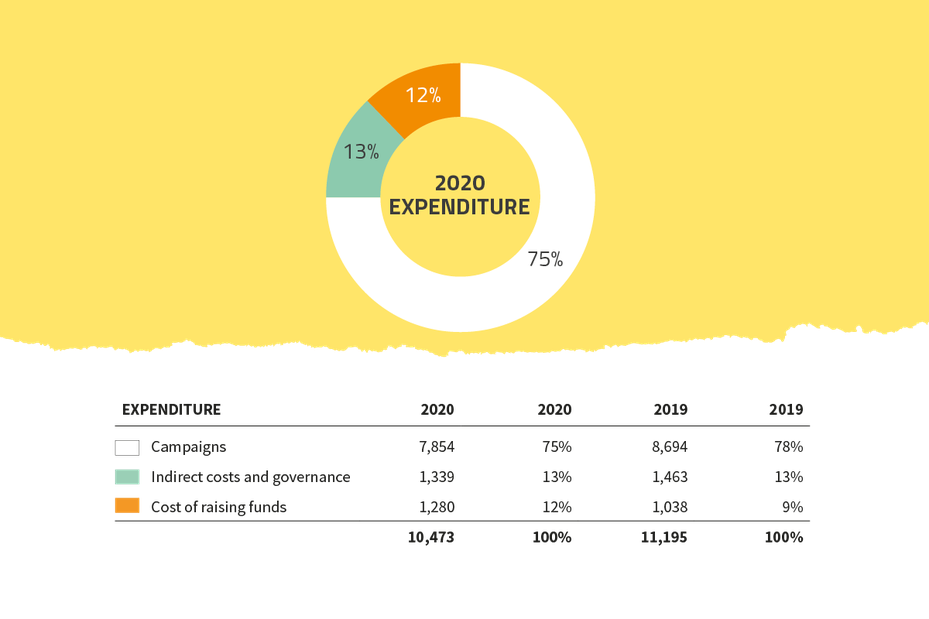
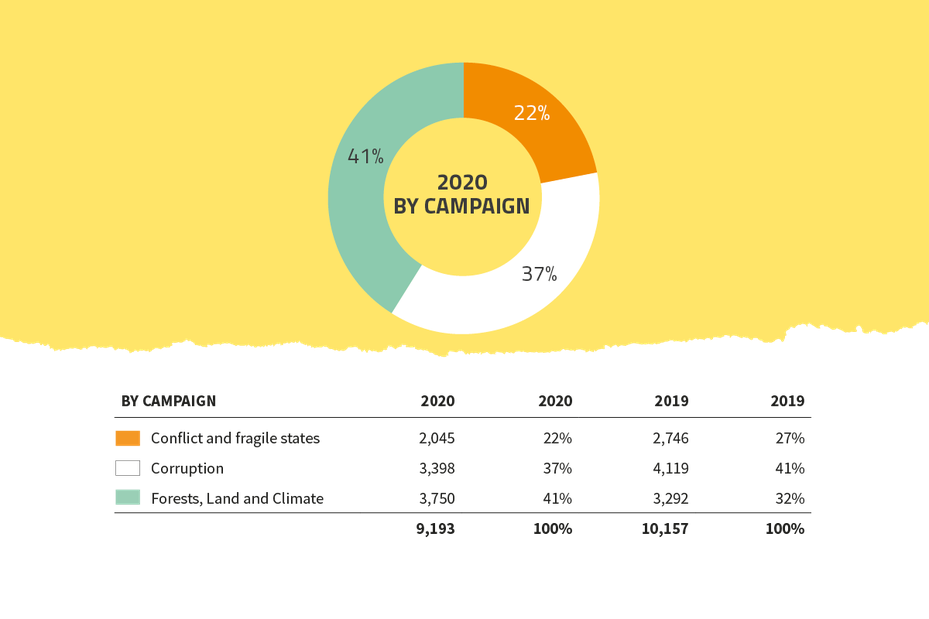
The summarised financial statements are extracted from the full statutory directors’ annual report and financial statements which were approved by the directors and signed on their behalf on 4 May 2021.
These summarised financial statements may not contain sufficient information to gain a complete understanding of the financial affairs of Global Witness.
View the full statutory directors’ report, financial statements and auditor’s report
Resource Library
2020 Global Witness annual report
Download Resource